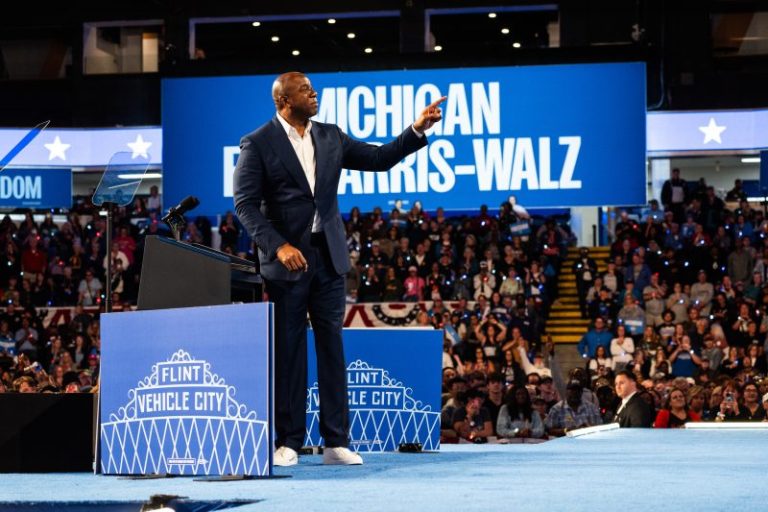Vice President Kamala Harris is making a major push this week to boost her support among Black men, as Democratic leaders warn that she needs to do more to boost enthusiasm from a key group that former president Donald Trump has been courting with some success.
In coming days, Harris plans to travel to urban locales including Detroit, Philadelphia and Erie, Pa., where she will be meeting with Black entrepreneurs and highlighting what her campaign is calling an “Opportunity Agenda for Black Men.” Aides say the proposals are aimed at helping Black men build wealth, expanding their access to lending and providing additional tools to support those trying to start or expand businesses.
There is growing public concern among Democratic lawmakers, activists and community leaders that Harris is trailing past Democratic nominees among Black men, a softness in support that pollsters and campaign officials say could be significant in a close race.
Some Democrats acknowledged that some Black men may feel the party has not always focused on them or fulfilled its promises to their community.
Harris’s initiative is “a continuation of the vice president’s commitment and a focus to specifically talk to Black men, who have felt left out and marginalized even within the Democratic Party at times,” deputy principal campaign manager Quentin Fulks said. “That is something that I don’t think is unique to Vice President Harris, but as president and as leader of the Democratic Party, it’s something that she knows that we need to do and we need to address.”
Among Black registered voters, 72 percent of men support Harris compared with 85 percent of women, according to a Pew Research Center poll released last week. Those figures represent strong majorities, but they are weaker than Biden’s standing at this point in the 2020 election. Trump has made overt appeals to Black men, insisting that his economic policies would be more beneficial to them than those of the Democrats.
Harris aides are hoping to draw attention this week to an agenda focused on Black men that the vice president began shaping before becoming a presidential candidate. Harris launched a multistate tour in April that highlighted economic opportunities for Black men — meeting privately with Black entrepreneurs, business owners and faith leaders — as she keyed in on the demographic at a time when Democrats worried that Biden, then the likely nominee, was losing support among a critical voting bloc.
The vice president’s advisers are casting the latest push as an extension of that effort, but it comes as more Democrats express concern that Harris’s ascension to the top of the ticket has not solved the party’s challenges with Black men, and may even complicate them.
Former president Barack Obama, in an appearance last week in Pittsburgh, admonished Black men whom he said might be hesitant to support Harris because she is a woman, even though Harris has not emphasized her gender in the campaign.
“You’re coming up with all kinds of reasons and excuses [not to support Harris]. I’ve got a problem with that,” Obama said. “Because part of it makes me think — and I’m speaking to men directly — part of it makes me think that, well, you just aren’t feeling the idea of having a woman as president, and you’re coming up with other alternatives and other reasons for that.”
He added that choosing between Trump and Harris should not be “a close call.”
Harris’s “Opportunity Agenda for Black Men” includes a pledge to provide a million forgivable $20,000 loans to Black entrepreneurs and others to start businesses, an initiative that would come in addition to Harris’s proposed $50,000 tax deduction for small businesses.
The plan also includes proposals to invest more in apprenticeships in Black neighborhoods; to recruit and retain more Black male teachers; and to launch a health equity initiative, which would address health challenges that disproportionately affect Black men. The vice president will also highlight her support for legalizing recreational marijuana and will advocate for Black men to take a greater role in the national cannabis industry.
“At the end of the day, there are a lot of Black men out there who want to create generational wealth, want to be able to start a small business — and you have to create policies that are holistic across the board that do that,” Fulks said.
Still, some pieces of Harris’s agenda involve proposals she has already put forward or actions the Biden administration has already implemented for all Americans. On issues such as expanding broadband connectivity or expanding the child tax credit, for example, the Harris campaign is touting the potential impact on Black men of policies that are broadly available across all races and are either in place or have been previously proposed.
In addition, the Supreme Court’s 2023 ruling against affirmative action in college admissions could make it hard for Harris to implement specific policy proposals that apply exclusively to Black men.
Trump, in courting Black male voters, has attacked Harris on immigration, the economy and foreign policy. That has been effective among a small but potentially significant contingent of younger Black men, aides to both campaigns have said.
While some polls show Harris trailing Biden’s 2020 performance with Black men, her aides have highlighted other data that show her on par with Democrats’ showing four years ago.
A CBS News poll released Sunday found that 87 percent of Black likely voters support Harris, compared with 12 percent supporting Trump. Those numbers match exit poll data from 2020, when Biden claimed a similar portion of Black voters. But the poll also found that the likelihood for Black turnout lagged that of White voters, an indication of a potential enthusiasm shortfall among the party’s most loyal voting bloc.
In interviews with The Washington Post across the battleground states in recent months, some Black men praised Trump’s business background and said his experience in that realm gives them greater confidence in his ability to create jobs and improve the economy. Some also expressed disappointment in the gap between what Biden promised and what he was able to deliver, particularly on the economy and inflation.
Harris will have a chance to speak in more detail about her plans Tuesday at a town hall-style event in Detroit hosted by Charlamagne Tha God, one of the hosts of the radio program “The Breakfast Club.” The show is popular with younger Black voters, and the event will be broadcast across 140 radio stations Tuesday night.
As they try to address the disparity in support for Harris among Black men and women compared with that of Biden four years ago, some Harris surrogates are trying to dispel what they view as Trump’s economic mystique, arguing that his advocacy for tariffs, as well as tax cuts for high earners, could come at the expense of average working Americans.
Former congressman Cedric L. Richmond, co-chair of the Harris-Walz campaign, said the vice president is intent on giving Black men the tools to succeed, while Trump’s agenda would create a “national nightmare” for Black Americans.
At a recent rally in Michigan, former basketball star Magic Johnson argued that Trump did little or nothing to help Black men last time he was in the White House.
“Our Black men, we’ve to get them out to vote,” Johnson told the crowd. “Kamala Harris’s opponent promised a lot of things to the Black community last time that he did not deliver on. We have to help Black men understand that.”



